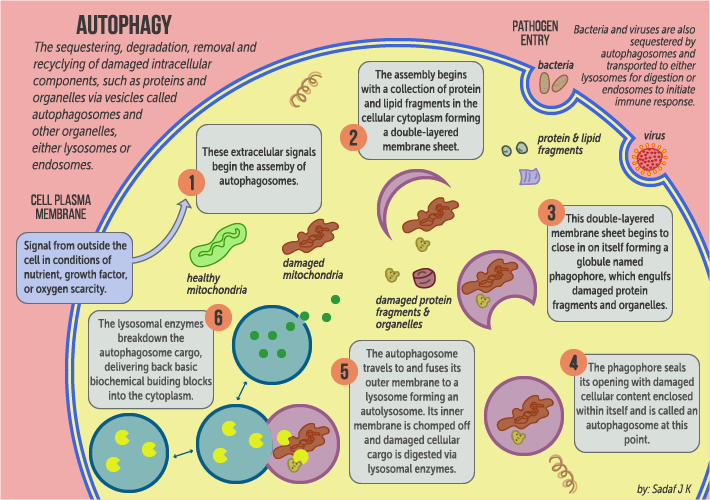Fasting is a key aspect of many religions and diets, yet the question of how healthy it is for one’s body remains a contested one. Intermittent fasting is a trendy new diet, and based on a new study from The University of Wisconsin-Madison, the trend has scientific validity unlike many other popular food trends in the last decade.
Scientists tested different diets on four different groups of mice. One ate a full amount but fasted, one ate as much as they wanted, and two others were underfed. The most healthy mice were the ones who fasted, as they got the right amount of calories, and saw benefits such as longer life, and better blood sugar control.
Why is this? One of the main reasons for this is autophagy, which is the process of moving cell waste. When one is fasting, there is more time in the body for cells to carry out the process. In this process, organelles which have been harmed are removed; they are often brought to the lysosomes. When there is more time to do this, the cell can focus on its normal function more efficiently, while still getting the appropriate calories for function.
Dudley Lamming, head researcher for this study, saw similar results for both male and female mice. He noted that medical research should look at how fasting can be imitated by drugs and treatment as a means of healing, due to its health benefits.
Personally, an aspect of this experiment that I do not love is the mistreatment of animals, being the rats in this case. While there are valid reasons for their use, such as biological similarities to humans, I dislike how some rats are underfed and are harmed. Nonetheless, this is a study that helps prove the benefits of fasting, which can lead to big medical findings in the future regarding human health.



shallele
As someone who experiences fasting for 24 hours once a year for Yom Kippur, I found this post particularly interesting. I learned from the article you linked (https://www.healthline.com/nutrition/intermittent-fasting-guide), about the varying techniques of performing intermittent fasting. I found the 16/8 method particularly interesting. I have, what I previously thought was bad, a habit of skipping breakfast. The concept of Imitating fasting using drugs and treatment also caught my interest. When researching the topic, I found this resource (https://www.centerforhealingneurology.com/2019/06/09/stimulate-autophagy/) which demonstrates alternate ways to optimize autophagy efficiency. These processes, including increased anti-oxidants in diets, provide an explanation to this question.
biosyntaysis
Fascinating post, jervoussytem! I have always wondering what the impacts of fasting are on health our health and I like how you focused on the benefits when individuals have the correct calorie intake – many people promote fasting because they therefore don’t eat a meal, are in a calorie deficit, and lose weight (https://theconversation.com/intermittent-fasting-if-youre-struggling-to-lose-weight-this-might-be-why-123498) – but this shows me, as someone not interested in the weight loss aspects, how eating my three meals after fasting can be beneficial for my health. I also appreciate how you mentioned the treatment of rats. It is so interesting to consider whether the benefits of the findings of a study outweigh the mistreatment of rats or other animal test-subject. In this case, I think I would say yes as the underfed rats may lose weight, but they can gain their weight back and survive. This topic of fasting could lead to findings which will impact drugs and treatment as you said, which could be crucial for the medical world! I wonder if having sick patients fast could help those with neurological problems as cell waste is so bad for neurons (https://blogs.bcm.edu/2019/03/12/from-the-labs-understanding-the-cell-waste-disposal-problems-in-lou-gehrigs-disease/). Again, great post!